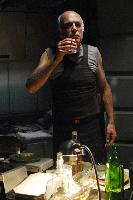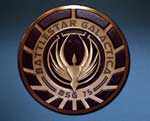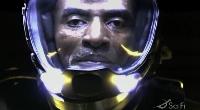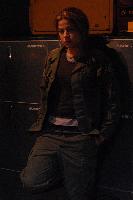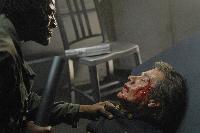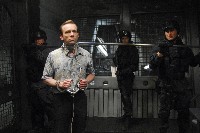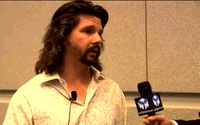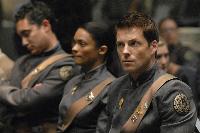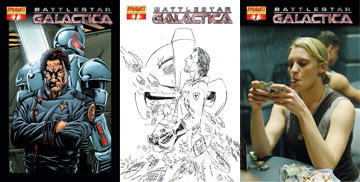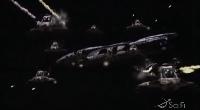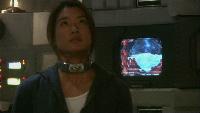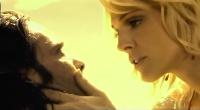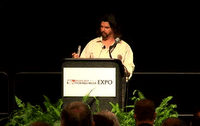
Source:
Tom's Hardware GuideIntroductionWhen science fiction author Harlan Ellison introduced Ronald D. Moore at the recent Screenwriting Expo 5 in Los Angeles, Moore received a standing ovation. It was a testament to the success, critical acclaim and passionate following of "Battlestar Galactica," which has become the reigning champion of science fiction.
Ellison, dressed in a black suit with an orange tie and orange shoes, gave Moore the Screenwriting Expo's award for Television Writer of the Year. "You were given swine and you made pearls out of them," Ellison said. "This award is for the astonishing job of making one of the worst television series ever made into one of the best television series ever made."
Moore humbly accepted the award, thanking his many writing partners over the years for helping him become a better writer. "The truly best part about writing for television is something called the writer's room, where you get to sit in a room with other very talented people and write stories day after day and hour after to hour," Moore said. "They become your family. It's a very singular experience. And if I'm here for a reason, it's because I've sat in writer's rooms for 13 years, and 'Battlestar Galactica' is in many ways a result of that process."
Moore dedicated the award to the dozens of writers who helped him, especially the late Michael Piller, who worked with Moore on Star Trek before dying last year after succumbing to cancer. Moore discussed Piller and his fellow writing partners at Star Trek, and how those experiences influenced his work on "Battlestar." Moore and Ellison also discussed the real world parallels of the 9-11 terrorist attacks and the Iraq War in the science fiction show.
Ellison: Tell us what kind of trepidation you had [about "Battlestar"].
Moore: I didn't have much trepidation by the time they made the offer. I got this phone call where someone asked, "would you be interested in doing 'Galactica'?" And I wasn't sure at first. I hadn't seen the original show in a long time, since its original run, and I had done a very long time at Star Trek. So I had a lot of years out in space and I didn't know that I wanted to keep doing it.
I took a weekend to think about it, and went out and found the pilot of the original show, which I hadn't seen in 20 years. I brought it home and watched it, and you can certainly pick apart the pilot 50 different ways. It doesn't work on a lot of levels, and there's some really bad stuff in it. But I was really intrigued by the premise. At the heart of that show was a really interesting idea.
The original show has the same premise that ours does, which opens with an apocalyptic attack on the human colonies; it opens with the genocide of man. And then the show is about the survivors, who are not fighting back, but running away from their enemies perpetually into the night. And I thought that was an intriguing place to be.
When I was looking at the pilot, it was January or February of 2002, so this was just a few months after the 9-11 attacks. I realized there was no way you could do this project without the audience bringing to the party their feelings, memories and emotions from that event on some level. And I thought that it would be an interesting series if you treated that idea truthfully, and tried to go to what really happens to people in those circumstances, and tried to tell an honest story about what happens when an unthinkable event like that occurs to everyday people. When they're not the crew of the Enterprise, when they're not the best of the best, but rather people on a broken down ship that nobody cares about anymore, crewed by a bunch of screw-ups, and that's humanity's last best hope. And I jumped at it after that, because I realized it was an opportunity. Since then, I've always thought that what we do on the show is to take the premise of the original series more seriously than they did.
Reality And Science FictionEllison: The parallels to current events are obvious; in particular, I think that the analogies to the Iraqi War are very clear. Did the parallels come from you or from some Sci-Fi [Channel] exec?
Moore: Fundamentally, they came from me. I felt, in that first week of thinking about it, that, okay, this is going to deal with 9-11 and a lot of the things we were going through as a society at that moment. It was just part of the premise. It was always going to be in the show, and once we were on that path, it just felt like we were going to keep doing this and we're going to deal with things that are happening in our contemporary reality, but we were going to view them through a different prism.
The show was never going to be a direct allegory; Laura Roslin was not going to be George W. Bush, and the Cylons were not going to be al-Qaeda. But they were going to share elements. And part of the opportunity of doing a show like this was the opportunity to sort of move the pieces around the game board a little bit and say: "Well, we've all experienced this set of events. What if I move this piece over here, and put you over there? How would you feel about it then?"
There was a Sci-Fi [Channel] exec that had a key impact on the show, surprisingly enough. His name is Michael Jackson (no relation to the singer.) He worked for the network, and while I was working on the script for the miniseries, he read a line from Number Six, the blonde Cylon played by Tricia Helfer. She had a conversation with Baltar, and at one point she says, "God is love." It was just something that I found on the page as I was writing it. And I wrote, and I was struck by it because it's an odd thing for a robot to say. I liked it, but didn't really know what it meant, and it wasn't a focal point of the script.
But when Michael read the script, one of his notes was: "That's fascinating. You already have elements of al-Qaeda and religious fanaticism hovering around the edges of what you're doing. Why don't you embrace that and go for that element because they don't typically do that in Sci-Fi." And my first reaction was: "Oh my God! Nobody ever gives you that kind of note, especially not an executive."
So I just ran with it, and it became one of foundational elements of the show: the religious conflict between the two civilizations; the monotheism of the Cylons and the polytheism of the Colonials; what is God, what is human, and what does it mean to be alive. All of these metaphysical ideas and religious concepts sort of groove from that one line in the teleplay.
Religion, Superstition, And HeroesEllison: My next question is about religion. The Cylons are the monotheists; they believe in God and are good Christian folk. And the crew, who are our heroes, are polytheists like the ancient Egyptians or Greeks. It was always interesting, but until recently there was never a third element; now the venue has changed and there's a supernatural quality. A spiritual force is at work. Can you codify that?
Moore: I sort of felt that as the religious aspects of the show were becoming more common and started to dominate plot lines and certain character attributes, you sort of had to make a choice at some level about whether that was all bullshit or not. Does it mean something? Is all this worship just about talk and about made up religions that don't mean anything? Or is there the possibility of something greater? These are the existential questions. Is this all that I am? Is there something more? Why am I here?
If all the characters on the show are asking themselves those questions, I felt that on some level I wanted to give a hint that maybe they're not all fools. That maybe there's some greater truth that they're all struggling toward, that none of them can see perfectly. So I started to feather in ideas that could not be explained by rational means. While never really coming out and saying that God is behind the curtain, I wanted to have elements of it.
One of the things that I had noticed working on Star Trek, and in science fiction in general, was that mainstream science fiction tended to shy away from this as a subject. Gene Roddenberry felt very strongly that in the future of Star Trek, religions were all gone; that in 300 to 400 years mankind had evolved beyond it; that religions were all superstitions and were things of the past. It was a very secular humanist idea, which I don't have a problem with philosophically, but I didn't believe as a storyteller that in just a few centuries we would discard this fundamental thing that had informed our societies for so long.
So, I just felt that in this world in Galactica, which had nomenclature like Apollo and Athena and all these names of the Greek gods, it beggared the imagination to say that they didn't really believe in it. And if they did believe it in, I wanted to give it some validity and show that there is something out there.
Ellison: Apart from your awe and wonderstruck admiration for me and my work, who were your heroes when you were a kid?
Moore: This is a facile answer, but my hero as a kid was James T. Kirk. I grew up watching the original Star Trek series, and that character meant a lot to me.
Ellison: Not William Shatner.
Moore: No, not William Shatner. Jim Kirk. There was something about that show and what it stood for, and what he in particular stood for. The time I was becoming fascinated by T.V. Star Trek was also within the decade of JFK and the Kennedy assassination. I was sort of raised in the culture that was still imbued with that myth of the martyred president, and the two sort of merged a bit in my world.
And they're very similar: there are certainly things about Kirk that are very "new frontier" and very much in the spirit of what John Kennedy was all about, at least in my opinion. So those were my two big heroes as I was growing up: Kirk and Kennedy.
Influences And Broken HeartsEllison: Who has broken your heart? Someone in your life, someone in the business has broken your heart.
Moore: I've known people and worked with people that -
Ellison: Betrayed you.
Moore: Yeah...I've had partnerships with some writers that on some fundamental level I thought I knew. It's the same old story. You never think it's going to happen to you. You establish friendships and trust and loyalty, and there comes a point where that doesn't matter. It becomes about something else, and that's painful. I think that it's hard, in my experience, especially with a writing partner.
When you're writing with somebody, it's almost like a marriage. That's a very special bond. You sit in that room where you write separately and then you argue and work on the page and you slave many hours and you expose yourself - you're vulnerable. And I think the mistake that gets made - that I made - is that sometimes you let that professional intimacy cross over into a personal intimacy. And it's like a marriage, and there's an expectation that [the relationship] is going to transcend that profession. You know, "No matter what, I've got your back and you've got mine and that's the bond we have." But that's not always the case, because on some level it is still a professional relationship.
And so I had a writing partner and it did break my heart. But at the same time, I look back on it now and think I probably should have known better, and I probably should have been smarter at the time. And if I had to do it over again, I might have made the same mistakes all over again because it's in my nature to extend that trust. But I don't think I would have been quite as surprised the second time around.
[Editor's Note: Moore doesn't name names here, but it's clear to any knowledgeable Star Trek fan that the writing partner in question is Brannon Braga. Moore and Braga had written a number of "Star Trek: The Next Generation" episodes, including the final episode "All Good Things...," as well as the feature film "Star Trek: First Contact." Following his work on TNG, and after writing a number of episodes for "Star Trek: Deep Space Nine," Moore began to work on "Star Trek: Voyager" during its sixth season, reuniting with Braga, who was the show's executive producer. But the reunion was short-lived and Moore left the show, later stating that the working relationship between himself and Braga had broken down.]
Ellison: There's got to be something in us that speaks to naiveté. And when it goes sour, it's worse than just some network executive cutting you off at the hips.
Moore: Yeah. During my first year at "Star Trek: The Next Generation," that first writer's room I was in was really important to me - personally and professionally. There was something about sitting with that group of men and women day after day. And we really told each other and felt that we were in the trenches together; that this was a bond that mattered and that transcended everything else; that we were writers and we were going to protect each other. There is a mindset to the writer's room that it is a bunker, and there are people out there that are trying to screw up your story, and they're either production people trying to cut your budget or they're network executives that don't understand -
Ellison: Actors...
Moore: And actors who don't want to say your lines. It's like everyone who's not in that room is the enemy on some level, and you're all banding together to fight them. That's really the mentality. But you're all just people, and it's a transitory thing. You get on these projects and for that moment, for that season, and for that show, these people will be the most intimate people in your life, and they will matter to you almost as much as your family. And you'll sweat with them and bleed with them and cry with them. But then it will end, and then you'll go on to the next project.
That first writing staff I was connected to at Star Trek is still very much in my bones, but there are other writers that I've worked with that I've never seen again.
Ellison: Do you still see the people from that original writer's room?
Moore: I do see them periodically, all except one, whom I've lost contact with. The original room was Ira Steven Behr, Michael Piller, Hans Beimler, Richard Manning, and Melinda Snodgrass. And I haven't seen Melinda in years.
Before "Battlestar"Ellison: At some point you have walked away from productions - as I have - just saying that it doesn't matter how much money they're paying me, the money doesn't matter. Where did you get those stones? What in your upbringing, your background and your life experience gave you the stones?
Moore: A few different sources. My father, most of all. He's a man of tremendous strength, and there's a certain iron integrity to my dad that I grew up with. You [Ellison] as well. I've written about this on my blog, which I'm sure all of you read.
There were two incidents with Harlan that honestly imprinted on me. The first time I saw him I was at the first science fiction convention I went to, when I was in college. It was up in Stony Brook, New York. And I remember sitting up in the balcony thinking to myself, "Oh my God, this is what a convention is like. This is strange..."
I was looking down and Harlan was one of the guest speakers. And he came out and started to read this piece. [To Ellison] I don't know if you remember this piece. You read it to the audience. There was an incident in the early-to-mid-'80s. Some of you might recall it. On the Washington, D.C. mall, a man in a van had driven up to the Washington Monument and claimed that it was full of dynamite or explosives some kind, and he was going to blow up the monument as part of a protest. It was national news, and there were police everywhere. Eventually the man was shot and killed [by police snipers]. And Harlan was reading this piece about him. The tenor of the piece was essentially defending the man, or at least trying to have empathy for him, and understanding what he was trying to protest, while making the point that the police had overreacted.
But the thing that struck me was that the crowd turned. The crowd turned on him and was starting to boo and yell things back at the stage. And I was standing up there on the balcony thinking, "Wow". I didn't know if I agreed with what he was reading, but it was the way he just went at it. He refused to bow down. He just said: "Be quiet, I'm not done. You can boo when I'm finished." And he just plowed through it, and he was just unwilling to back off. And I admired that. There was something suicidal about it. He had this belief and this piece and he was going to read it, dammit, and he was going to say every word.
So many years later, while I was working at "Roswell," I was developing a show called "Dragonriders of Pern," based on the novels by Anne McCaffrey. We were trying to get the pilot made and we were very, very close to the pilot actually being shot. It was at the network which is now dead, the WB. The network was essentially going to rewrite the entire thing, and we were like five days away from shooting. And I was reaching this flash point. Harlan and I, J. Michael Straczynski (of "Babylon 5" fame) and a couple of other gentlemen whom I can't recall were on a panel at the Museum of Television and Radio in Hollywood. And I was sitting on this panel, and I knew that the next day I was going t have to have a conference call with the network. I was going to have this dreaded, nightmarish showdown with the network. Was I going to let them rewrite ["Dragonriders"] with some other writer, or was I going to stick by my guns and they could pull the plug on it? This was my first pilot, and it was a big thing.
There came a point at the end of the panel where the moderator asked each of us what our advice was to aspiring screenwriters. And we all went down the line and I had my little answer that I always give and I gave it. And then I sort of tuned out and thought "Well, I've got problems." Then it was Harlan's turn, and he seized the microphone and said: "Don't be a whore! Whatever you do in this business, don't do it for the money. Don't be a whore, it has to matter, have integrity, stand up for what you believe."
And he just went on this jag, and it really struck me. It was like a scripted T.V. moment. So the next day I got on the phone and I refused to rewrite the script and they pulled the plug and the pilot died. And I never regretted that for a moment. And those are the two Harlan moments I recall.
Ellison: [pause] You never know what pebble you're going to throw into the pond that actually kills a fish.
Moore: Well, you'll be happy to know that there was an entire cast and crew that was furloughed because of that little pebble you threw out there, not to mention the hopes of millions of Anne's readers who were crushed.
Ellison: First of all, I'm tearing up. And as you can probably tell, I'm not a...whatever.
Ellison: Who pulled the plug on ["Dragonriders of Pern"]?
Moore: It was the WB.
Ellison: But who?
Moore: The name? To be honest, I don't remember. It was a conference call with a half dozen people. And I remember the moment. I said "I'm sorry, I can't do this script. I'd be happy to rewrite, but I'm not going to do this script. It had to be the one we started with. That's the show." And they said, "Well, let us think about that for a moment. Can we put you on hold?" Okay. So we sat there on hold - me and representatives from the studio - we all sat on hold for a good two minutes, twiddling our thumbs and starting to talk to one another. But then somebody said, "No, they could be listening!"
So we were all afraid to say something but trying to make small talk, and then suddenly they came back on the line. They said, "Well, if that's the way you feel, why don't we all just say goodbye and say it's over with?" And there was a silence. And I said, "Okay." We all said goodbye, thanks, no hard feelings, and hung up the phone. And then all hell broke loose. There was screaming, phone calls and people just couldn't believe it.
Ellison: You had to have taken something from personal experience that's iconic.
Moore: I don't know what this says, but it says something. I was at Cornell and I was in the Navy ROTC. I wanted to be a U.S. Naval officer, but that all fell apart for me in my senior year. It didn't work out and I was asked to leave.
Ellison: Why? What did you do?
Moore: Nothing, really. I just stopped going to class for, like, two months. And I was not asked back, and I left and went to Los Angeles and started my life over. I was living in L.A. maybe four or five years later and I went back to Cornell to the place that I had lived. I still had some suitcases and boxes up in the attic, and I went to go find them. I was digging through a trunk and found the shoulder boards that I used to wear on my [ROTC] uniform. They were stuck in the corner of the box, and one almost had a corner bent.
There was something important about them. Even though I hadn't completed ROTC and didn't actually become an officer, there was something important that they represented, and something strange about the fact that they were forgotten and were lying in this trunk. They represented this greater ideal that I believed in, something that was larger than myself, something that was symbolic of many men and women that had done many things. I couldn't leave them there, and I couldn't throw them away.
So I put them in an envelope and I wrote a note that said: "These used to mean something to me. They still mean something to many people. Please take care of them." And I left them at the door of the ROTC building. And when I did, I felt...better. I felt like I had closed the door on something.
Q&ALater on, during the discussions, Ellison opened up the chat to audience members. Moore talked about story development, the natural lifespan of a show, and the importance of knowing when to leave the stage. He also talked about how much longer "Battlestar" may run, and where the journey will finally conclude.
Audience Member: How do you keep your story arcs from dragging on too long?
Moore: There's no easy answer to that, because it's sort of an instinctive kind of feeling of when you think a story has run its course, or how long you think it can go. And you just hope for a reasonably high batting average.
There was a story arc that worked out over the course of the first season [of "Battlestar"] and we hoped it was going to run all season long, which was Helo and Sharon down on Cylon-occupied Caprica. And I was determined that we were going to run that all year. There were a couple of times where we felt like it was treading water, but overall, that arc carried us all the way to the end of the journey. Other arcs just get started and stopped because you think there's something there to say or a story to be told and then they run out of gas. So you're really doing it by instinct.
Ellison: Do stories have their own natural length?
Moore: They do. Shows, certainly. In my experience, shows definitely have a natural life. I think "Star Trek: The Next Generation" stayed on one year too long; that was kind of the consensus among the writing staff. We really liked our sixth year; we felt proud of it, and pushed the envelope in a lot of ways in terms of what Star Trek could be. But when we came back in the seventh season, there was just this sense of profound fatigue, creatively. We sat in that writer's room and thought, "well, we haven't met Geordi's mother yet so let's bring her out." We were bringing out all this random stuff, and we all just knew that we had been on stage too long. We had passed the point of the show's natural length.
Ellison: Do you have a specific destination for the show in mind, and if so, can you just tell us what it is?
Moore: I do actually know how I want the series to end, but I didn't know at the beginning. It was as we started into the second year that the show had matured to a certain point, and I sort of understood what all of the themes were about; now I do have an idea of where it should end. Right now the challenge is about judging that correctly. Know when to leave the stage.
Hopefully, you bring it to a close perfectly. It's just about if you can line up all of those pieces at the exact right moment. I have an idea of where it's going to go, and I've started the season with fear that I didn't have enough stories to get to the end. So right now my gut says that we've got a couple of more years to do it. I could see two more seasons. Next year you can ask me the same question and maybe I'll say two more seasons again. So yeah, I don't know.
 Source: SciFi Weekly
Source: SciFi Weekly



